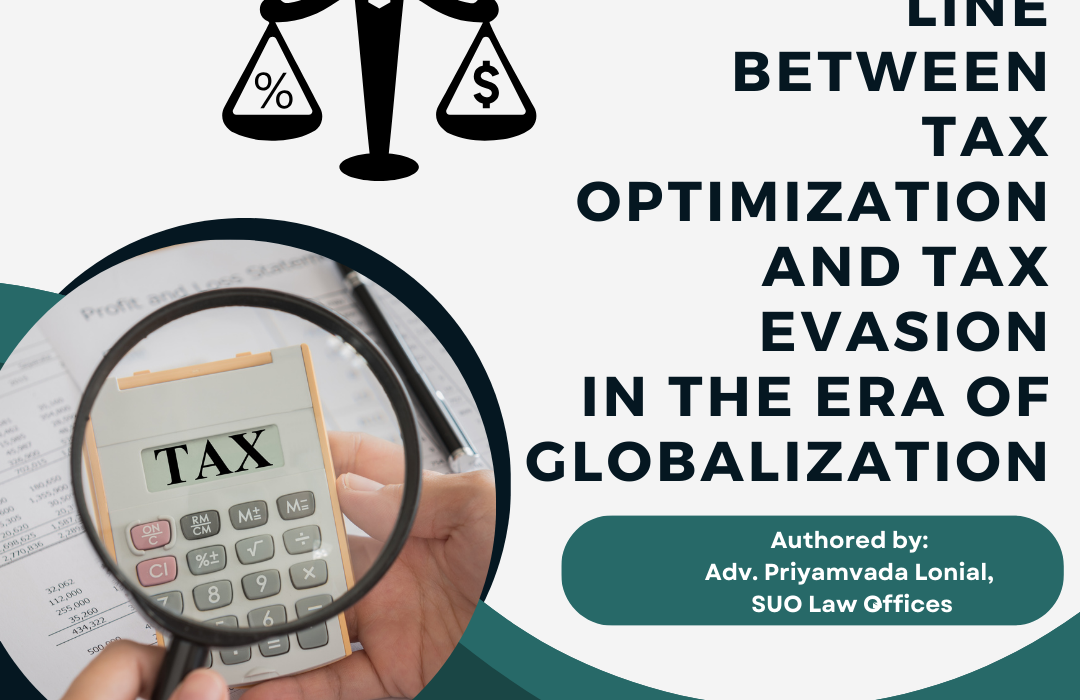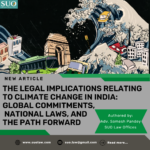EXPLORING THE FINE LINE BETWEEN TAX OPTIMIZATION AND TAX EVASION IN THE ERA OF GLOBALIZATION
Taxes are indispensable to the functioning of any economy, and provide governments with requisite funds to run the country. However, tax rates are more than mere digits, and have a profound impact on countries, as they play a pivotal role in attracting investment and putting places on the global business map. In light of the same, it is only fair to acknowledge the fact that these regimes are more often than not, complicated; and pose challenges to individuals and businesses alike, who oftentimes devise strategies (both, legal and illegal) to lower their tax liability. This brings us to the present article which is premised on threeclosely inter-linked, yet distinct issues in the domain of tax management: planning, avoidance, and evasion. The same have been in the spotlight multiple times in recent times, thanks to high-profile cases like the infamous Panama Paper Leaks, and Apple’s Tax Arrangements in Ireland. Keep reading to gain further clarity on the legal and financial ramifications associated with each route, the dilemmas posed by them, and recommendations to navigate these challenges efficiently.
Planning, Avoidance, or Evasion? An Overview
As stated above, the concepts of tax planning, tax avoidance, and tax evasion are distinct, yet inter-connected to the point wherein many laymen think that they are one and the same thing. At this juncture, it becomes important to clear the air since any misconception and/ or misstep can subject the individual/ company to significant loss of money, business, and reputation.
To begin with, tax planning is a legal route which includes the usage of tools like deductions, credits, exemptions, and investment into certain vehicles to reduce liabilities. It involves adherence to the applicable laws and is even encouraged. Tax avoidance, on the other hand, is the practice of reducing tax liabilities by exploiting the loopholes and grey areas in tax codes to minimize tax liabilities. While tax planning is perfectly legal, tax avoidance is often looked down upon, with its legality being questioned due to the sheer contradiction between the objective of the statute and the outcomes of the taxpayer’s actions. Since there exists a rather blurry line between the two, it is important to have in place robust mechanisms like the General Anti-Avoidance Rules (GAAR) [India], and the Anti-Tax Avoidance Directive [EU] to keep a check on illegal and unethical practices.
Moving further, tax evasion covers actions which demonstrate one’s intention to escape from payment of taxes. The methods resorted to herein, include filing of incorrect tax returns, misrepresenting income, exaggerating losses and expenses, deliberately concealing assets in offshore accounts, and not filing returns at all. As you might know, tax evasion is a criminal offence punishable with hefty fines, and even prolonged periods of imprisonment. Looking for something to jog your memory? Think Sahara Group [India], Walter Anderson [The US], and the Pandora Papers.
To conclude this section, the key differences among the threeconcepts are based on legality, intention, disclosure and consequences. While tax avoidance treads dangerously on the fine line between legality and illegality, tax evasion is an outright violation of laws.Now that the basic differences have been elaborated upon, the next point of contention involves the legal and ethical considerations associated with the above-mentioned practices, and their impact on the economies of the respective countries.
Legal & Ethical Considerations
Before we delve into the legal and ethical dilemmas surrounding tax optimization strategies like planning and avoidance, it is important to have a look at the concept of aggressive tax planning (ATP). It is not merely the practice of exploiting loopholes in laws, but also involves turning to complex tax structures that take advantage of different tax regimes to reduce liabilities artificially. The key practices involved herein are debt shifting, moving intellectual property and intangible assets to low-tax jurisdictions, transfer pricing, and tax treaty shopping.
Talking about the legal considerations, there exists a fine line between legality and illegality in the domain of tax management; one which needs to be dealt with extreme caution. Ethical considerations, on the other hand, are much more complex and have a broader impact on the society. For instance, while a big-shot company may be using perfectly legal means to optimize its tax liability, the societal impact of these actions might be unfair; particularly for smaller businesses and individual taxpayers which may not have as much resources at their disposal.
While we talk about the ethical considerations surrounding tax planning and tax avoidance, corporate social responsibility (CSR) is an un-missable aspect. As the general public becomes more informed about the unfair tax practices being deployed by big players such as MNCs, companies are now facing increasing pressure (rightfully so) to align their tax policies with the host country’s CSR norms/ goals. Defying these norms has the possibility to create a massive dent in the reputation of these companies. For instance, Starbucks received significant backlash for paying lower tax in the UK by shifting its profits to low-tax jurisdictions. In light of the same, especially in this day and age of enhanced connectivity, it becomes important to strike a balance between legal and ethical aspects of tax management.
Another important aspect herein is public perception. While tax planning isn’t generally scrutinized due to its neutral/ positive impact on the society, the same cannot be said for tax avoidance and tax evasion. Tax avoidance is often viewed critically, due to the personal motives of the individuals/ companies resorting to the practice. It harbours the potential to impact the effectiveness of the tax system due to the possible exploitation of loopholes. Tax evasion, on the other hand is heavily criticized for depriving the public sector of necessary funding. Tax evasion and the subsequent flow of black money can have, and has had adverse impacts on the society, such as exacerbating the gap between the rich and the poor, increased inflation, decline in living standards, increased corruption, among others.
Regulatory Challenges vis-à-vis Case Studies
Policymakers across the world are often plagued by challenges, particularly in the domain of tax, owing to multiple reasons such as jurisdictional differences in laws and tax treaties, and difference in interpretation of laws. While many countries implement pro-investor tax regimes to attract FDI and enhance cash flow, these practices are looked down upon by their contemporaries. This often leads to the creation of infamous ‘tax havens’, which are often used by wealthy individuals, and MNCs to circumvent taxes. While countries across the world are cracking down on such tax havens, there is still a long way to go because the angle of such countries’ sovereignty comes into play.
Another way whereby individuals and companies make an attempt to leverage favourable tax regimes, is by resorting to programs like golden visas, and non-domiciledtax schemes. These programs, which were initially enacted with the objective of attracting FDI to the respective host countries, came to be exploited for the purposes of money laundering, tax avoidance, and tax evasion. Some infamous examples pertaining to the same would be as follows:
- Panama Papers: The controversy arose in 2016 when 11.5 million encrypted, confidential documents belonging to the now closed down law firm Mossack Fonseca were leaked. It ended up bringing to light a vast network of tax havens holding the money of several prominent figures and companies from over 200 nations.
- Apple’s use of the Irish Tax Regime: The European Commission imposed a penalty of nearly €14 billon on Apple for exploiting Ireland’s favourable tax regime to bring its tax liability down to 0.005%. The EC considered this to be illegal state aid and asked for the amount to be paid back.
To combat these incidents, regulatory bodies across the world have come up with several initiatives to harmonize global tax laws and subsequently clamp down on tax evasion and aggressive tax planning. Some examples in this context, include the Base Erosion and Profit Shifting Project (BEPS) and the Global Minimum Tax initiative by the OECD. They aim to target tax avoidance strategies employed primarily by MNCs to minimize their tax liabilities.
The Way Forward: Recommendations
While policymakers across the world are now pro-actively working towards striking a balance between tax optimization and greater global economic goals, the implementation and strict enforcement of the following measures would prove to be helpful:
- Closing the existing loopholes in tax regimes to prevent unfair profit shifting
- Enhancing transparency and accountability by MNCs’ in the domain of tax filings
- Strengthening the implementation of OECD and other similar guidelines
- Promoting the alignment of tax strategies with broader CSR goals
To conclude, it can be said that though there are plenty of options available which can be leveraged upon to optimize tax liability, it is important to exercise the same in a way which is legally compliant, ethical, and sustainable for the operations of the business. With the onset of globalization, it will be interesting to observe how these policies evolve with respect to each country, and their subsequent impact on the global tax and business landscape.
Authored by: Adv. Priyamvada Lonial, SUO Law Offices


